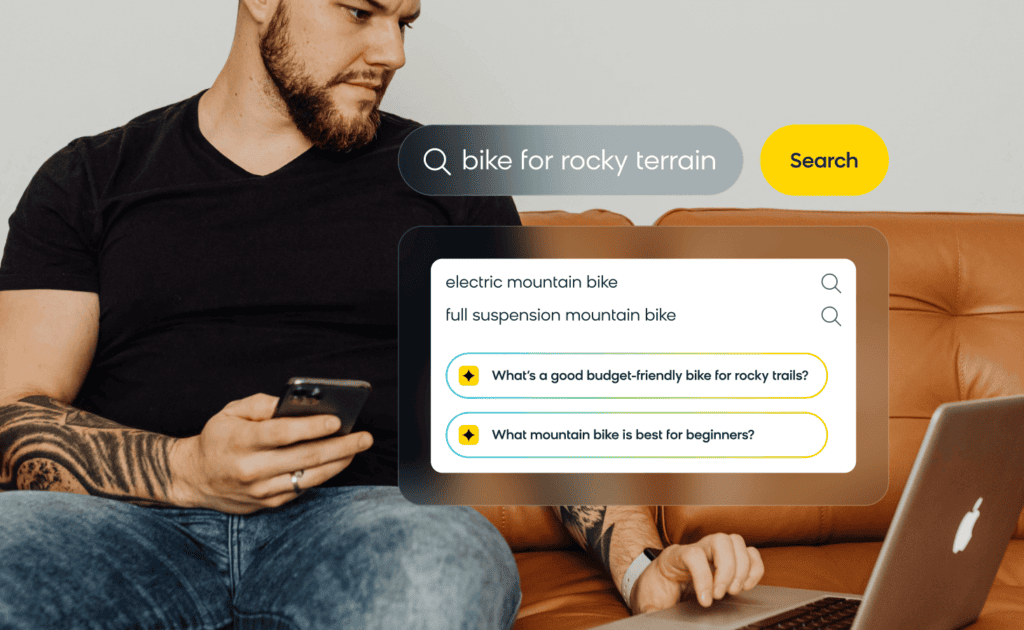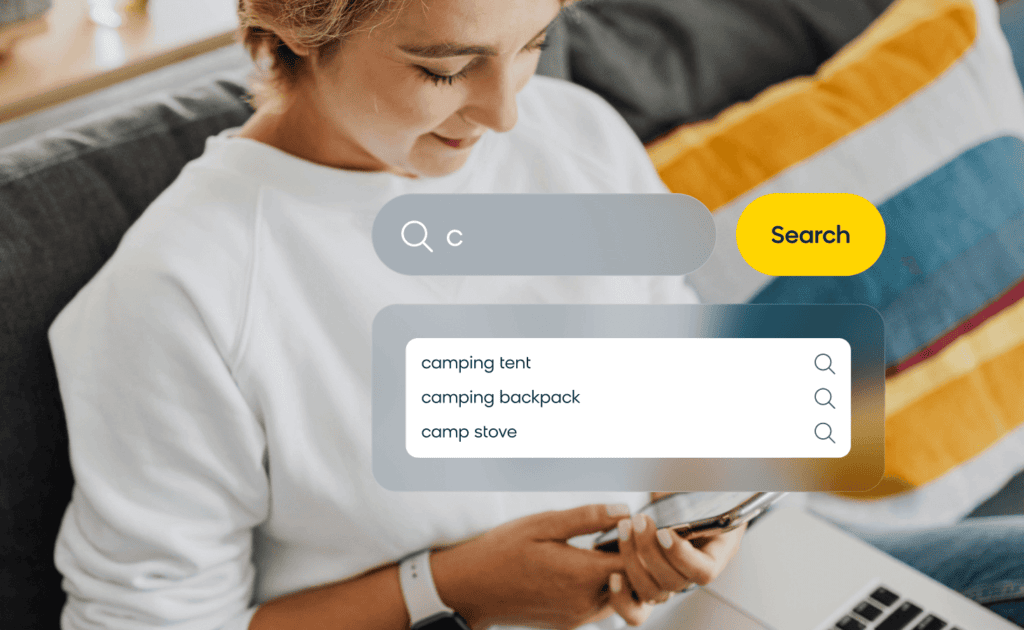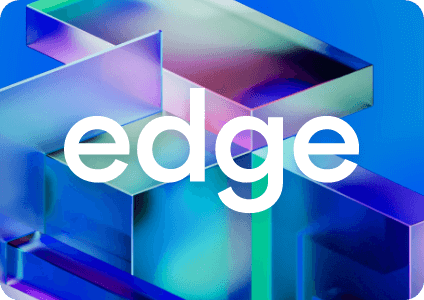Worried about choosing the right keywords? You’re not alone.
For years, ecommerce search has been all about finding the perfect keywords, the idea being that only the right search terms would connect your target audience with the right products.
Many companies still rely on this keyword-first approach, despite its many limitations. A typo or unconventional query can easily lead shoppers to irrelevant results (or no results at all). Worse, overlooking the “why” behind every search can frustrate shoppers. They’ll abandon a site that doesn’t deliver what they need.
Artificial intelligence changes that. Instead of matching exact keywords, AI-powered search can conversationally interpret user intent, behavior, and context, so your brand can deliver more relevant results, faster. But not all AI is created equal — Bloomreach Discovery takes this even further by using advanced AI to bridge the gap between what shoppers type and what they want.
Keep reading to see how AI is reshaping ecommerce search and giving brands a competitive edge.
What Is Customer Intent in Ecommerce Search?
Traditional ecommerce search focuses on the exact words customers type, not the intent behind their search. The problem is that this old-school way to search comes up short — a study found that 41% of major ecommerce sites have poor search functionality. Many of the sites don’t fully support exact searches (33%), product type searches (29%), feature searches (38%), or use case searches (36%). That’s a lot of potential customer queries not getting properly addressed.
Search intent is the reason behind a customer’s query, whether they’re exploring new products, restocking a favorite, or searching for something specific. Understanding this intent data is key to driving sales and improving the shopping experience.
Think of it like a call center. When someone calls, their request is categorized and routed to the right department, so they can get high-quality customer support. Your site search should work the same way, guiding shoppers past irrelevant results and straight to what they need.
AI is an ideal partner for customer intent because it goes beyond simple keyword matching (or even basic AI personalization). It can pull customer data from various sources (like social media interactions and previous website visits), analyzing that data to better understand behavior patterns and context. It can also handle the types of user queries that often confuse traditional search, so customers can find what they’re looking for, no matter how they phrase it.
What’s more, the right AI can go beyond the search bar and turn shopping into a conversational experience that keeps customers engaged and boosts conversions.
Types of Customer Intent in Ecommerce
Specific intent may vary from customer to customer, but in ecommerce, everything tends to fall into three main categories:
- Informational intent: The shopper is researching before making a decision (e.g., “best gardening tools for beginners”). Since 34% of users search for non-product content (and often don’t find what they need), offering a knowledge base can move them closer to a purchase.
- Navigational intent: The shopper knows what they want and is searching for a specific brand, category, or product page. These searches tend to be more direct, like “Benefit skin tint.”
- Transactional intent: The shopper is ready to buy. A search like “gardening rake” signals they’re past the research phase and looking to make a purchase.
Your ecommerce team may struggle to distinguish between different types of customer intent — after all, they often look similar. A shopper researching a product and one ready to buy might use nearly identical search terms.
AI tools are a huge help here. By analyzing past behavior and preferences, AI quickly identifies your customer’s purchase intent and adjusts search results accordingly, saving your team from endless guesswork. You’re left with a more intuitive search that enhances the user experience and drives sales.
Common Search Challenges Ecommerce Brands Face
Keyword-based site search is already long outdated, but even AI solutions can leave a lot to be desired. Do any of these search challenges sound familiar?
The Problem With Most Search Engines
Many ecommerce brands still rely on search engines that can’t keep up with how modern customers shop. Even AI-based search can fall short, providing surface-level personalization that doesn’t meet customer expectations.
For example, let’s say a shopper searches for a “sofa that’s good for a 2-bedroom apartment with pet cats.” A traditional keyword-based search will likely show very few relevant results because those keywords aren’t present in product descriptions. Meanwhile, a typical AI-based search engine will be able to show some relevancy, but won’t be able to initiate a conversation that can take the personalization further.
High Bounce Rates Due to Irrelevant Search Results
If you’re facing high bounce rates, your search function should be one of the first things to check. Traditional search ignores customer intent data when filtering results pages, increasing the chances of a poor search experience. Over time, this curbs your revenue goals and damages your reputation.
AI technology can enhance search relevance, which will in turn improve customer retention. When shoppers can easily find the right product, it speeds up the entire customer journey and helps you sell more products in a shorter amount of time.
Missed Revenue Opportunities From Search Abandonment
Search abandonment is a major challenge for ecommerce marketers. When shoppers can’t satisfy their search, they take your potential sales with them. Most search engines often miss long-tail queries or struggle with misspellings and context, leading to missed opportunities.
AI can identify these search queries and suggest relevant products, reducing search abandonment and increasing conversion rates. This improves customer loyalty and boosts your bottom line.
How AI Search Optimizes Relevance and Engagement
With the right AI tools, you can manage site search proactively instead of reacting to problems after they happen. Here are the features that make this possible:
Natural Language Processing (NLP) for Smarter Search Results
AI uses natural language processing and semantic analysis to deliver more intuitive search results. NLP, a type of machine learning, analyzes spoken or written language to identify customer needs. Just like in everyday conversations, shopper searches can be full of details and unique phrasing. Where keyword matching would stumble over these searches, NLP can interpret meaning without getting thrown off by wording.
For example, a shopper searching for a “shirt to wear to a wedding” or a “bike for rocky terrain” doesn’t need to match exact keywords to find relevant results. NLP recognizes intent and context, ensuring shoppers get the right recommendations, no matter how complex the query.

Personalized Search Results Based on User Behavior
Keyword-based search doesn’t remember anything about your shoppers. It treats loyal customers and first-time visitors the same. But personalization matters, and this is where AI comes in. AI personalizes search results based on search data, browsing history, and engagement patterns so that no two customers have the same experience. Bloomreach Discovery’s self-learning AI refines results in real time, growing smarter with each interaction to handle even the most unconventional search queries.
Let’s say a customer previously purchased a luggage set that they later returned. When they search again for “luggage set” on the site, Bloomreach knows to bury results featuring the previously returned set. Additionally, the AI knows that they’ve searched for a luggage set multiple times, and can start a conversation to get more information and direct the customer to the right product in real time.
AI-Driven Autocomplete and Query Suggestions
Have you ever started typing a product name in a search bar and noticed suggestions popping up, helping you finish your query faster? Autocomplete is a perfect example of machine learning in action. Machine learning helps computers learn from data on their own, improving accuracy over time. It predicts and suggests keywords as you type, making the search quicker and easier.
Artificial intelligence takes autocomplete to the next level by refining results while users are searching, guiding shoppers to the most relevant options before they’ve even finished typing. AI also suggests related products and corrects typos. For example, if a shopper frequently searches for camping gear, then as soon as they type the letter “c,” AI can autosuggest items like “camping tent” or “camping backpack,” making the entire shopping process feel more seamless.

Bloomreach Discovery lets you take this a step further. As your customers search, they can also see auto-generated questions that they can click on to get answers to commonly asked questions. This will help them make more informed decisions and improve their likelihood of purchasing.
Dynamic Ranking for Intent-Based Search Results
There’s a reason why your favorite streaming service updates its homepage dozens of times while you’re logged in. Outdated algorithms can’t keep up with customer demand, and the same goes for your site search. Dynamically changing how you present your products is like Netflix suggesting another true crime documentary to keep you glued to the couch.
Bloomreach Discovery uses AI to dynamically rank your products, helping customers get exactly what they’re after faster than traditional search. It adjusts rankings instantly, taking into account demand, popularity, and user behavior. If a customer frequently searches for “wireless earbuds,” Discovery can push your best-selling or highest-rated earbuds to the top of the search results, where your shopper is more likely to notice and buy them.
AI-Driven Search That Understands Your Customers
Is your checkout feeling clunky? Noticing drop-offs before customers complete their purchase? Your site search might not recognize customer intent.
AI helps interpret what shoppers are looking for, whether they’re browsing, comparing options, or ready to buy, so they get the right results at the right time. That equals less frustration and higher conversions.
Bloomreach Discovery is built with a powerful GenAI core that refines search results in real time, reducing bounce rates and driving revenue by surfacing the most relevant products and keeping customers engaged with conversations. Best of all, your team can focus on strategy while you use AI for the heavy lifting. It’s site search — simplified for everyone.
Ready to optimize your search and increase conversions? Request a demo today.













